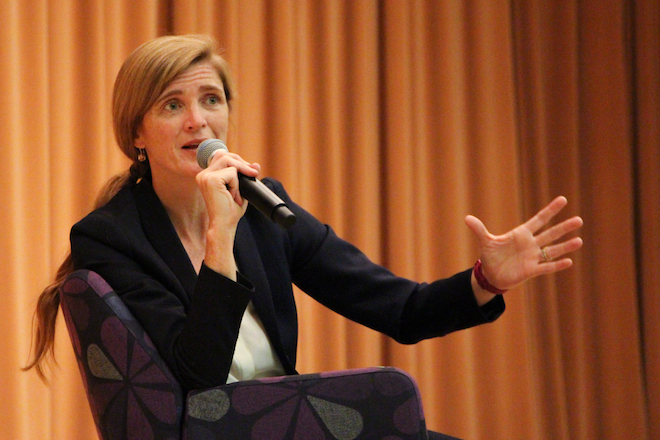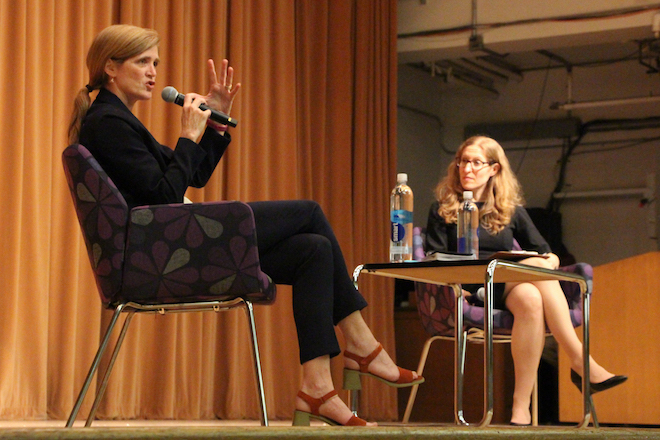Samantha Power, former U.S. Ambassador to the United Nations, spoke with students at Northwestern on Monday evening about her experiences covering war and serving under the Obama administration as part of the Contemporary Thought Speaker Series.
Following her career as a war correspondent, Power served as the Obama administration’s National Security Council’s Special Assistant to the President, Senior Director for Multilateral Affairs and Human Rights and chair of the Atrocities Prevention Board. In addition to her work with the Obama administration, Power won the Pulitzer Prize in 2003 for her book, “‘A Problem from Hell’: America and the Age of Genocide.”
Throughout her political career, Power has gained notoriety for her dedication to women, refugees, human rights and multilateral affairs.
The conversation, which was moderated by Wendy Pearlman, an associate professor in the political science department, covered a broad range of topics, from Power’s war correspondence in Yugoslavia to her thoughts on the Trump administration. From the start, Power’s accounts and insights exhibited how her political passions are rooted in her personal experiences.
When asked about her views on immigration policy, Power indicated how her childhood immigration to the U.S. affects her beliefs, saying that as a result of her upbringing that she has the “…ability to step into other people's’ shoes is with me.”
Her ability to understand and empathize with others forms the very basis of Power’s political beliefs, and it extends to her understanding of how to tackle global challenges.
This sense of human compassion also drew Power into her work as a war correspondent in the former Yugoslavia.
In regards to how the war in the former Yugoslavia shaped her, Power said that seeing images of “emaciated men behind barbed wire” in The New York Times greatly affected her.
“It was concentration camps in Europe, this was in 1992 into 1993, and so I was very jolted by that, the idea that all of these years after the Holocaust, you could have people being systematically targeted because of an immutable characteristic,” Power said.
Power offered her own insight into the complex choices regarding U.S. intervention in Libya and Syria.
“My point is… these choices are excruciating, and you’re making them on the basis of limited information,” Power said. “You’re making these judgments, and had we made the decision to stay out of Libya… there’s no evidence that Libya today would be stable… My point is, these are really hard choices.”
In spite of the heavy topics that Power spoke about, her conversation also tried to shed light on foreign policy successes.
Weinberg freshman Lucy McDermott remarked that she was surprised at how optimistic Power was in her discussion of the Bush administration’s foreign policy, and said, “I think that [Power] was very realistic about everything, but I thought that she was more realistic than I would have expected. She didn’t give the doom and gloom that you hear on the news.”
Despite her willingness to discuss foreign policy failures, Power refused to end the conversation there. Instead, she focused on the potential that government institutions have for good.
“It was the most remarkable triumph of reason over fear, and it’s what the government can be, and it’s what the U.N. can be when you’re willing to move away from abstractions and deal as best you can with finding real solutions to help good people,” Power said.

